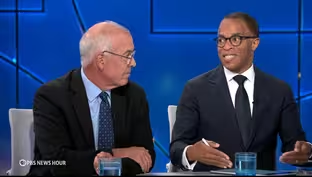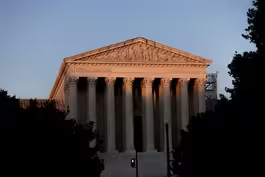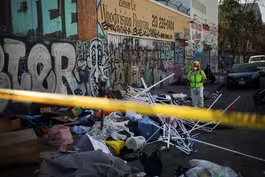
How private companies could cash in on Trump's deportations
Clip: 7/25/2025 | 5m 48sVideo has Closed Captions
How private companies could cash in on Trump's mass deportations
The ramifications of President Trump’s sweeping tax cut and spending law are beginning to play out. That includes cuts to several federal programs, while significantly increasing spending in other areas, like immigration enforcement. Stephanie Sy reports.
Problems playing video? | Closed Captioning Feedback
Problems playing video? | Closed Captioning Feedback
Major corporate funding for the PBS News Hour is provided by BDO, BNSF, Consumer Cellular, American Cruise Lines, and Raymond James. Funding for the PBS NewsHour Weekend is provided by...

How private companies could cash in on Trump's deportations
Clip: 7/25/2025 | 5m 48sVideo has Closed Captions
The ramifications of President Trump’s sweeping tax cut and spending law are beginning to play out. That includes cuts to several federal programs, while significantly increasing spending in other areas, like immigration enforcement. Stephanie Sy reports.
Problems playing video? | Closed Captioning Feedback
How to Watch PBS News Hour
PBS News Hour is available to stream on pbs.org and the free PBS App, available on iPhone, Apple TV, Android TV, Android smartphones, Amazon Fire TV, Amazon Fire Tablet, Roku, Samsung Smart TV, and Vizio.
Providing Support for PBS.org
Learn Moreabout PBS online sponsorshipGEOFF BENNETT: The ramifications of President Trump's sweeping tax cut and spending law are starting to play out.
That includes cuts to several federal programs, while significantly increasing spending in other areas, like immigration enforcement.
Stephanie Sy has more.
STEPHANIE SY: That's right.
Specifically, the bill allocates $170 billion toward immigration enforcement, including a 265 percent increase in the national immigration detention budget, which will be used to double bed capacity, largely through private detention facilities.
Currently, ICE is detaining more than 56,000 immigrants around the country.
Joining us to discuss the potential impact of these changes is Jamiles Lartey, a staff writer who has been reporting on this story for The Marshall Project, a news organization focused on criminal justice.
Jamiles, thanks for joining the "News Hour."
So, $45 billion in taxpayer dollars going to building more immigration detention facilities.
Mind you, most of these detainees have not had any criminal convictions.
What's the impact of that kind of investment?
JAMILES LARTEY, Staff Writer, The Marshall Project: Yes, I mean, so the One Big Beautiful Bill Act is a budget authorization.
And there are still appropriations and procurement processes that have to come in terms of how that money is spent.
So when you look at this colossal sticker price, I don't think we can confidently say what the impact is yet.
It's only been a few weeks.
With that being said, the intended impact is quite clear.
And that includes a more than more than doubling the immigration detention bed space in the country from about 40,000 to over 100,000.
That includes the administration moving forward with contracts on massive tent complexes at places like Fort Bliss in Texas, opening previously shuttered facilities.
And that includes funding to entice and coerce local officials to assist or at least stay out of the way of ICE enforcement efforts across the country.
STEPHANIE SY: And, in that sense, it can really change sort of the law enforcement environment in some municipalities.
Now, 85 percent of the immigrants detained are in these private facilities.
You have sat in on the earnings calls of the companies that run them.
What's been their reaction?
JAMILES LARTEY: Well, look, private prisons, by definition, have a fiduciary obligation to shareholders to maximize profit, right?
So, in that context, let's just use common sense.
Every medical service not rendered, every food item not purchased, every accommodation not provided serves the interests of shareholders, up until the moment that conditions get so bad that the government cancels the contract or a lawsuit forces them to pay out.
So, in immigration detention, that tipping point almost never comes.
Contracts are routinely renewed even after serious violations.
That's something that predated the Trump administration.
But as this administration pursues its hard-line and often performatively cruel approach to enforcement, it seems like it's only likely to become more common.
In terms of how the companies are reacting, they're excited, right?
That's the simple answer.
They're excited and they see this as an opportunity to be more financially successful than they have ever been.
STEPHANIE SY: You called it performatively cruel.
And groups like Human Rights Watch have called out the conditions in holding facilities and describing the treatment as degrading and dehumanizing.
Aren't those accusations, though, also implicating government-run facilities, not just private ones?
JAMILES LARTEY: Absolutely, and that's a critical point.
Whether we're talking about immigration detention or prisons more broadly, there's often a lot of focus on private companies because of the, I think, obviously unseemly incentives at play.
And while those dynamics are something that I think people are rightfully probing, it's definitely important to acknowledge that the government is perfectly capable of creating inhumane, unconstitutional conditions on its own.
STEPHANIE SY: The DHS provided us with a statement, which I'm going to read in part.
They say -- quote -- "Any claim that there are subprime conditions at ICE detention centers are false.
All detainees are provided with proper meals, medical treatment, and have opportunities to communicate with their family members and lawyers.
Ensuring the safety, security, and well-being of individuals in our custody is a top priority at ICE" -- end quote.
And they also added that what they call lies about these detention facilities have led to an 830 percent increase in assaults on the men and women of ICE.
Has the Trump administration put in place any additional checks or accountability as it expands these facilities?
JAMILES LARTEY: Yes, I mean, I can't speak to every internal policy memo that may exist somewhere within DHS, but in terms of what the administration has publicly emphasized and prioritized, we have not seen any meaningful new safeguards aimed at preventing abuse.
In fact, what we have seen here are moves that cut the other way, limiting access to facilities by members of Congress, shortening or weakening inspection protocols, and deepening reliance on private prison contractors who operate with less transparency.
So, whatever internal efforts or reforms may exist, they're not what's being highlighted or reinforced publicly.
STEPHANIE SY: Jamiles Lartey with The Marshall Project, thank you for joining us.
JAMILES LARTEY: Thanks for having me.
Brooks and Capehart on the Epstein files and Trump's base
Video has Closed Captions
Clip: 7/25/2025 | 13m 37s | Brooks and Capehart on the Epstein files fracturing Trump's base (13m 37s)
Kagan criticizes justices over lack of explanation
Video has Closed Captions
Clip: 7/25/2025 | 6m 46s | Kagan criticizes fellow justices over lack of explanation in recent Supreme Court rulings (6m 46s)
News Wrap: Israel considering alternatives to Gaza ceasefire
Video has Closed Captions
Clip: 7/25/2025 | 4m 53s | News Wrap: Israel considering 'alternative options' to ceasefire with Hamas (4m 53s)
The politics behind the $8B Paramount-Skydance merger
Video has Closed Captions
Clip: 7/25/2025 | 7m 34s | The politics behind the $8B Paramount-Skydance merger (7m 34s)
Ruth Asawa exhibit celebrates her influential art and life
Video has Closed Captions
Clip: 7/25/2025 | 7m 42s | Ruth Asawa exhibition celebrates her influential art and extraordinary life (7m 42s)
What Trump's order on forced treatment means for unhoused
Video has Closed Captions
Clip: 7/25/2025 | 5m 53s | What Trump's order on clearing encampments, forced hospitalization means for the unhoused (5m 53s)
Providing Support for PBS.org
Learn Moreabout PBS online sponsorshipSupport for PBS provided by:
Major corporate funding for the PBS News Hour is provided by BDO, BNSF, Consumer Cellular, American Cruise Lines, and Raymond James. Funding for the PBS NewsHour Weekend is provided by...

















